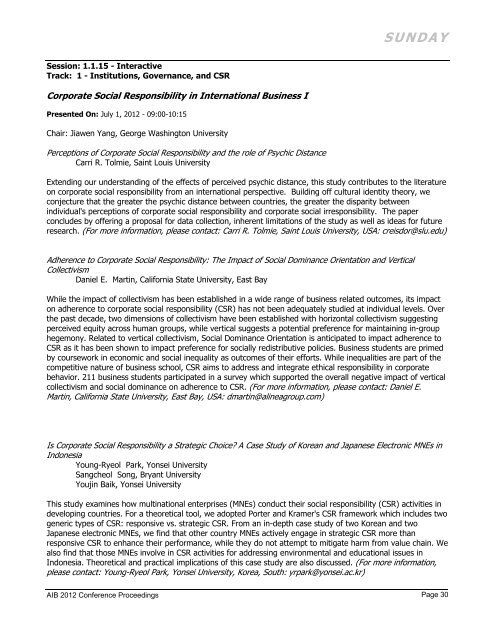AIB 2012 Conference Proceedings - Academy of International ...
AIB 2012 Conference Proceedings - Academy of International ...
AIB 2012 Conference Proceedings - Academy of International ...
Create successful ePaper yourself
Turn your PDF publications into a flip-book with our unique Google optimized e-Paper software.
SUNDAY<br />
Session: 1.1.15 - Interactive<br />
Track: 1 - Institutions, Governance, and CSR<br />
Corporate Social Responsibility in <strong>International</strong> Business I<br />
Presented On: July 1, <strong>2012</strong> - 09:00-10:15<br />
Chair: Jiawen Yang, George Washington University<br />
Perceptions <strong>of</strong> Corporate Social Responsibility and the role <strong>of</strong> Psychic Distance<br />
Carri R. Tolmie, Saint Louis University<br />
Extending our understanding <strong>of</strong> the effects <strong>of</strong> perceived psychic distance, this study contributes to the literature<br />
on corporate social responsibility from an international perspective. Building <strong>of</strong>f cultural identity theory, we<br />
conjecture that the greater the psychic distance between countries, the greater the disparity between<br />
individual's perceptions <strong>of</strong> corporate social responsibility and corporate social irresponsibility. The paper<br />
concludes by <strong>of</strong>fering a proposal for data collection, inherent limitations <strong>of</strong> the study as well as ideas for future<br />
research. (For more information, please contact: Carri R. Tolmie, Saint Louis University, USA: creisdor@slu.edu)<br />
Adherence to Corporate Social Responsibility: The Impact <strong>of</strong> Social Dominance Orientation and Vertical<br />
Collectivism<br />
Daniel E. Martin, California State University, East Bay<br />
While the impact <strong>of</strong> collectivism has been established in a wide range <strong>of</strong> business related outcomes, its impact<br />
on adherence to corporate social responsibility (CSR) has not been adequately studied at individual levels. Over<br />
the past decade, two dimensions <strong>of</strong> collectivism have been established with horizontal collectivism suggesting<br />
perceived equity across human groups, while vertical suggests a potential preference for maintaining in-group<br />
hegemony. Related to vertical collectivism, Social Dominance Orientation is anticipated to impact adherence to<br />
CSR as it has been shown to impact preference for socially redistributive policies. Business students are primed<br />
by coursework in economic and social inequality as outcomes <strong>of</strong> their efforts. While inequalities are part <strong>of</strong> the<br />
competitive nature <strong>of</strong> business school, CSR aims to address and integrate ethical responsibility in corporate<br />
behavior. 211 business students participated in a survey which supported the overall negative impact <strong>of</strong> vertical<br />
collectivism and social dominance on adherence to CSR. (For more information, please contact: Daniel E.<br />
Martin, California State University, East Bay, USA: dmartin@alineagroup.com)<br />
Is Corporate Social Responsibility a Strategic Choice A Case Study <strong>of</strong> Korean and Japanese Electronic MNEs in<br />
Indonesia<br />
Young-Ryeol Park, Yonsei University<br />
Sangcheol Song, Bryant University<br />
Youjin Baik, Yonsei University<br />
This study examines how multinational enterprises (MNEs) conduct their social responsibility (CSR) activities in<br />
developing countries. For a theoretical tool, we adopted Porter and Kramer's CSR framework which includes two<br />
generic types <strong>of</strong> CSR: responsive vs. strategic CSR. From an in-depth case study <strong>of</strong> two Korean and two<br />
Japanese electronic MNEs, we find that other country MNEs actively engage in strategic CSR more than<br />
responsive CSR to enhance their performance, while they do not attempt to mitigate harm from value chain. We<br />
also find that those MNEs involve in CSR activities for addressing environmental and educational issues in<br />
Indonesia. Theoretical and practical implications <strong>of</strong> this case study are also discussed. (For more information,<br />
please contact: Young-Ryeol Park, Yonsei University, Korea, South: yrpark@yonsei.ac.kr)<br />
<strong>AIB</strong> <strong>2012</strong> <strong>Conference</strong> <strong>Proceedings</strong><br />
Page 30

















